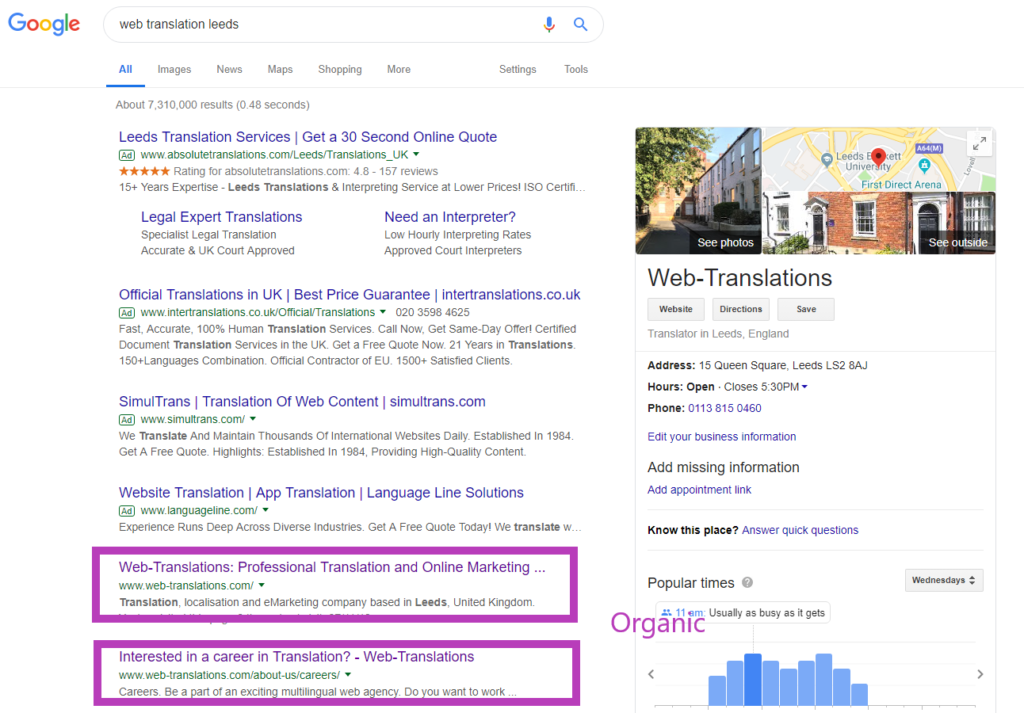New to the world of international eMarketing? Confused by terms like ‘organic’, ‘SERP’ and ‘algorithm’? Read on for a concise summary of the key factors that affect international SEO…
An eMarketer’s ultimate goal is for their website to appear at the top of the organic search results list in search engines like Google, Baidu and Yandex. ‘Organic’ results are those that are not paid-for advertising. In the image below, the results in the purple boxes are organic search results; the others above them are advertising. Google ads can be very expensive, and most people recognise these are advertising and may hesitate to click on them, so appearing near the top of the organic search results on the first SERP (Search Engine Results Page) is essential.
There are many factors that an engine’s algorithm, or set of rules for dealing with data, take into account when deciding which web pages to display, and in what order to display them. No one outside of the search engine companies knows exactly how these algorithms work, but you can read the general idea behind Google’s algorithm here.
With international SEO, it’s a good idea to make sure a site is optimised in a way that it appears near the top of Google results, as well as any other market-leading search engines. The same factors affect SERPs, both international and closer to home:
Content: the content in each of the pages of your website has to be the right length; between 600 to 2,000 words. It has to be relevant, and have keywords scattered in it. You want your keywords to be specific (we’ll come back to this), and don’t go overboard: place keywords in your page’s headings and on the text body, but don’t overuse them; remember the content will be read by real people who visit your site, not only search engines!
Crosslinking: by linking pages within a domain you show that you have several pages with similar-but-different content, ergo, that you’re an expert on the matter. When the hyperlink is a keyword (and it should be), it’s called an anchor.
Website visits: basically, if no-one visits your website, search engines don’t think you exist. For this reason, it’s good to get visits, either direct (by typing in the URL), organic (from a SERP), social (links on social media) or by referral (link in another website). The time visitors spend on your site is also important: it’s better if they don’t leave immediately, so you get what is known as a low bounce rate. This is another reason why you should make sure your content is engaging and visually attractive.
Website security: search engines favour secure websites with SSL certificates – the s in “https”. It is worth buying a certificate for your domain.
Backlinks: these give you authority if another website links to your URL. If many sites link to the same webpage, search engines will infer that it is worth displaying on a SERP. Links can be do-follow (links that pass authority) or no-follow (which site owners generally use when linking to unreliable pages). Backlinks are especially good if that website has domain authority (e.g. a website such as the NHS’ has domain authority), and can be bad if it’s a spammy site that is linking back to you.
Fresh content: frequently updating your content tells search engines that you are active. For this reason, it is wise to keep blogs on the same domain as your website.
Metadata: metadata is a snippet of text that describes what a webpage is about – it should be embedded in each page of your website and it’s what appears on the search results list. Good keywords and compelling copy will give you high clickthrough rates.
As you will have noticed, keywords play a key part in many of these factors (pun intended). But how do they work? And how do you localise them? In our next post, we will be looking in depth at international keyword research as part of this series on international SEO.
Learn more about how Web-Translations can assist you with optimising your website.
@Translators, if you’re interested in international SEO, look out for workshops on SEO offered by Yorkshire Translators and Interpreters.
13 February 2019 11:40

